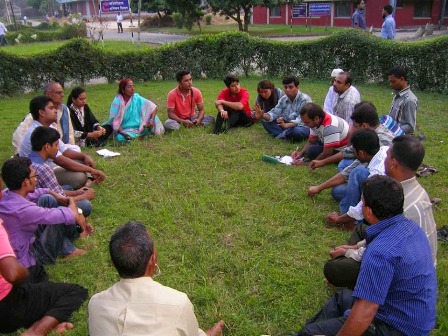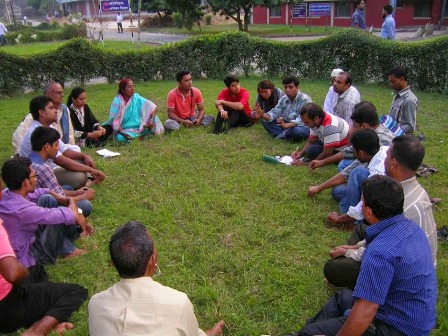Another successful caravan for climate justice, this time across South Asia!

 The South Asian Climate Justice, Gender Justice, and Food Sovereignty Caravan was organized in Bangladesh, India, and Nepal between 10 and 24 November, 2014. This year’s caravan informed and mobilized vulnerable peasant populations in order to respond to the threats of climate change, and to further develop international solidarity networks concerning climate change, gender and food sovereignty. It also addressed some of the other key issues in Bangladesh-India-Nepal agriculture sector like seed banks and energy alternatives.
The South Asian Climate Justice, Gender Justice, and Food Sovereignty Caravan was organized in Bangladesh, India, and Nepal between 10 and 24 November, 2014. This year’s caravan informed and mobilized vulnerable peasant populations in order to respond to the threats of climate change, and to further develop international solidarity networks concerning climate change, gender and food sovereignty. It also addressed some of the other key issues in Bangladesh-India-Nepal agriculture sector like seed banks and energy alternatives.
The Caravan was hosted by the Bangladesh Krishok Federation, Bangladesh Kisani Sabha (in Bangladesh), the Bharatiya Kisan Union, IMSE (in India), and the All Nepal Peasant Federation and All Nepal Women’s Association (in Nepal). It moved in the following way: Bangladesh- 6 locations from November 10 – 16, 2014
- Dhaka (capital): the Caravan commenced here
- Gajipur
- Madhupur, Tangail
- Iswardi, Pabna
- Sadhuhati, Jhenaidah
- Jagdishpur in Chaugachha, Jessore
India from November 17- 19, 2014:Kolkata
Nepal: 2 locations from November 20-24, 2014
- Kakarvitta
- Kathmandu (capital)
Badrul Alam, President Bangladesh Krishok Federation, also the chair, inaugurated the function on 10 November 2014 in the capital city of Dhaka in Bangladesh which is covered on our blog at http://lvcsouthasia.blogspot.in/2014/11/climate-justice-gender-and-food.html]. It was addressed by Bangladesh Agricultural Farm Labor Federation General Secretary Abdul Majid, Friends of Bangladesh representative Emma from Australia, Meghna Alam from Ekattro, Bangladesh Krishok Federation Office Secretary Pathak Lal Golder, Bangladesh Kishani Sabha Organizing Secretary Asma Begum, and Bangladesh Adivasi Samity President Sree Biswanath Singh, among others. As good as three hundred people including foreign delegates from Australia, Germany, UK, USA, India, Indonesia, Sri Lanka, Nepal, Sweden and New Zealand attended the inaugural.
On the following day in Gajipur, Bangladesh the highlight was the plenary session on GMOs and Bt Brinjal (Egg plant) issue that discussed the significance of local variety of seeds, its impact on human health, agriculture, ecology and the economy and the role of peasants in food production. The key recommendation to the authority was to ban the Bt. Brinjal keeping in view its negative impact.
Next day the event included a field trip to solar water and seed processing center in Madhupur, Tangail Bangladesh followed by seminar on agro-ecology, grassroots solutions to climate change; food sovereignty and indigenous peoples land right. The participants were of the views that the indigenous people are very close to the nature and preserve the ecology.
On the following day at Iswardi, Bangladesh during the discussion, Mr. Alam spoke on the broader aspect of climate change and proposed to UNFCCC to accept the grassroots people’ thoughts around solutions to climate change. He said, “the real solutions lie in the grassroots consisting of community people. The use of solar power, windmill, bio-gas, small hydro-electric power generation, charcoal, limited scale geothermal power generation can guarantee the clean energy.” The seminar also rejected the existing energy-security based on fossil fuel mining which jeopardizes the usual decoration of nature.
Next day a seminar in Sadhuhati, Bangladesh was held with the participation of local communities on climate change, climate migrants, grassroots adaptation and mitigation. The seminar deliberated that the rights of climate migrants should be protected by the UNO convention. The participants asked governments of all South-Asian region to play active role in order to realize the reparation for the people affected by climate change.
The seminar in Jagadishpur, Bangladesh focused on grass-root networking in South Asia to combat the climate change. BadrulAlam said “we have to have a strong solidarity among the movements in South Asia in order to realize the climate justice in the form of reparation from the industrially developed countries.”
Next day the caravan crossed border to reach Kolkata, India meeting and distributing leaflets during the travel. On 17 November 2014 more than thousand people from National Hawkers’ Federation welcomed the caravan. Climate issues were discussed by Mr. Alam and Mr. Shaktiman Ghosh for two days.
Then the caravan headed for Nepal on 19 November 2014. Next morning a seminar on climate change and Food Sovereignty was held in Kakarvitta, Nepal addressing the dreadful consequences of climate change in South and South East Asia. The caravan moved to Kathmandu, Nepal the next day.
On 22 November 2014 a people’s march was organized where the Deputy Prime Minister and Home Minister Bam Dev Goutam were present and made an opening speech for the P-SAARC which is a people to people forum in the SAARC region that enables non-government voices to come together at the regional level. Badrul Alam asked SAARC to strengthen the food and seed bank mechanism to ensure food sovereignty. In the following two days major workshops were held on review of P-SAARC declaration, enhancement climate change, farmers’ capacity enhancement and food sovereignty. This was followed by a closing ceremony of South Asian Climate Justice, Gender and Food sovereignty Caravan.
The caravan addressed the challenges of climate change in South Asian region as well as in the world. It provided a platform for peasants, indigenous people, Dalit, marginalized, subaltern, fisher folk, pastoralists, herders, plantation workers, agricultural workers, agricultural farm workers, women, and youth to express their concerns and share their experiences. Finally, a declaration was written based upon their experience.
